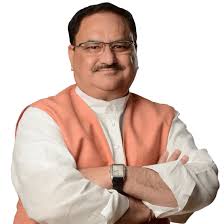
Nadda Announces Successful Completion of 100-Day Initiatives in Healthcare Innovation
Union Health Minister JP Nadda has marked a significant milestone in India’s healthcare sector with the successful implementation of the Department of Health Research’s (DHR) 100 Days Program.
The initiatives are part of the government’s long-term vision for "Viksit Bharat by 2047," aiming to boost healthcare innovation, pandemic preparedness, and indigenous medical solutions. Speaking at the event, Nadda stated, "These initiatives represent transformative steps toward a healthier, more resilient, and Atmanirbhar Bharat."
Key Achievements of the 100 Days Program:
Med-Tech Mitra Initiative
The Indian Council of Medical Research (ICMR) and Central Drugs Standard Control Organization (CDSCO) have collaborated on the Med-Tech Mitra initiative. Engaging over 250 innovators, start-ups, and industry partners, this platform assists in navigating regulatory challenges, clinical validation, and scaling up of healthcare products, accelerating India's strides in medical technology.
National One Health Mission (NOHM) for Pandemic Preparedness
In an effort to create a comprehensive defense against pandemics, the NOHM was launched to integrate human, animal, and environmental health. Over the past 100 days, significant progress has been made, including the establishment of a national network of 20 BSL-3 laboratories. Additionally, training programs were conducted at Pune’s National Institute of Virology (NIV) and Bhopal’s National Institute of High-Security Animal Diseases (NIHSAD).
As part of preparedness efforts, a mock drill named “Vishanu Yudh Abhyas” was conducted in Rajasthan’s Ajmer district, simulating an H5N1 outbreak. The government has also launched a national joint outbreak response team to detect infection hotspots and investigate emerging diseases.
ICMR has also developed wastewater surveillance tools, particularly for slaughterhouses, and has initiated the development of vaccines for Avian flu, Kyasanur Forest Disease (KFD), and MPox, alongside NIPAH monoclonal antibodies.
Integrated Research and Diagnostic Laboratories (IRDLs)
In a move to bolster research infrastructure, six Viral Research and Diagnostic Laboratories (VRDLs) are being transformed into Integrated Research and Diagnostic Laboratories, expanding their scope to cover infectious diseases on a broader scale. Construction of zonal laboratories for the National Institute of Virology (NIV) has also begun.
Development of Indigenous Drugs for Rare Diseases
To tackle the high cost of treatment for rare diseases, the Department of Health Research has launched a program to develop 12 indigenous drugs for eight rare conditions, including Muscular Dystrophy and Gaucher’s Disease. This initiative is expected to drastically lower the cost of life-saving therapies and make them accessible to those in need.
“First in the World” Challenge
Inspired by the success of India's Chandrayaan-3 mission, the “First in the World” Challenge will provide funding for 50 high-risk, high-reward innovations in biomedical research. This program aims to position India as a leader in cutting-edge healthcare solutions on the global stage.
Centre for Evidence-Based Guidelines
The soon-to-be-inaugurated Centre for Evidence-Based Guidelines will standardize medical practices across India. Supported by systematic review centers nationwide, this initiative will ensure that national health guidelines are backed by the best available scientific evidence, enhancing the quality of care across the country.
Research to Action Vertical
DHR has established a “Research to Action” vertical, designed to bridge the gap between research and policy. This will ensure that breakthroughs in health research are swiftly translated into actionable policies, benefiting public health at the grassroots level.
Research Capacity Building
Significant progress has been made in strengthening India’s research capabilities. Ninety-three fellows have been enrolled for PhD programs in medical research across various ICMR institutions. Additionally, 63 young medical faculty members and 58 women scientists have been awarded fellowships to pursue health research. These steps aim to build a robust physician-scientist base in India.
A Vision for a Healthier India
The 100-day initiatives underscore India’s commitment to advancing healthcare innovation and building resilience against future pandemics. By focusing on indigenous drug development, research capacity building, and public health preparedness, the Union Health Ministry is paving the way for a healthier and more self-reliant India.